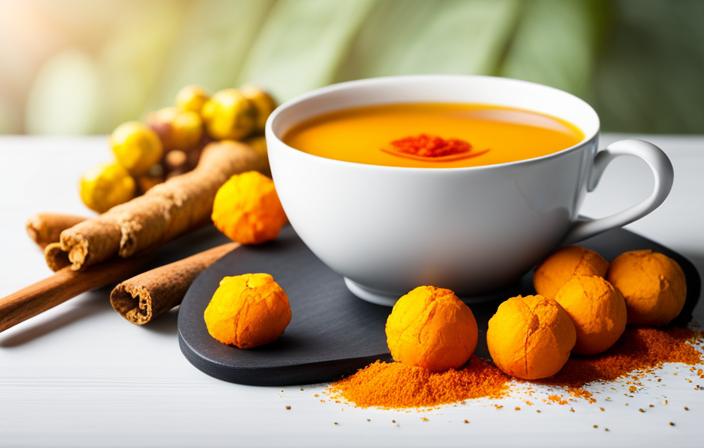Are you searching for a natural and efficient method to cleanse your body? Don’t look any further than turmeric tea!
Turmeric, a spice commonly used in Indian cuisine, has been gaining popularity in recent years for its potential health benefits. In fact, according to a survey by the National Center for Complementary and Integrative Health, turmeric was the third most commonly used natural product among adults in the United States in 2012.
Turmeric contains a powerful compound called curcumin, which has been shown to have anti-inflammatory and antioxidant properties. These properties may make turmeric tea an effective way to support detoxification in the body.
But what exactly is turmeric tea, and how does it work? Let’s explore the potential health benefits of this golden-hued beverage and the evidence supporting its detoxification properties.
Key Takeaways
- Turmeric tea is a natural and effective way to detoxify the body by supporting the liver’s ability to filter toxins from the bloodstream.
- Turmeric tea is rich in antioxidants, which can help protect the body from free radical damage and reduce inflammation in the body.
- Turmeric tea may potentially reduce the risk of chronic diseases such as heart disease, cancer, and Alzheimer’s by improving liver function, reducing inflammation, and providing antioxidant support.
- Precautions should be taken when consuming turmeric tea, including consulting with a healthcare provider before incorporating it into your diet and consuming it in moderation to avoid potential side effects.
What is Turmeric Tea?
Turmeric tea is a delicious and healthy beverage that can be easily made at home! There are many different turmeric tea recipes and brewing methods, so you can find the one that works best for you.
Some people like to use fresh turmeric root, while others prefer ground turmeric powder. You can add other ingredients like ginger, lemon, honey, or black pepper to enhance the flavor.
To brew turmeric tea, you’ll need to bring water to a boil and then add turmeric and any other ingredients you’re using. Let it simmer for a few minutes, then strain and enjoy! Some people like to add milk or almond milk to make it creamier, but that’s up to you.
Turmeric tea is a great way to start your day or to relax in the evening, and it has many health benefits as well.
Now, let’s talk about the properties of turmeric and why it’s considered a detoxifying agent.
Properties of Turmeric
With its anti-inflammatory and antioxidant properties, it’s no wonder that many turn to this golden spice for its health benefits. Turmeric’s medicinal properties have been recognized for centuries, and it has been used in traditional medicine to treat a variety of ailments. The active ingredient in turmeric, curcumin, is known for its anti-inflammatory effects, which can help reduce pain and inflammation in the body. Additionally, curcumin is a potent antioxidant, which means it can help protect the body against free radicals and oxidative stress.
To truly appreciate the power of turmeric, consider the following nested bullet point list:
-
Imagine waking up every morning feeling refreshed and energized.
-
Think about being able to move without pain or stiffness.
-
Consider the peace of mind that comes with knowing you’re doing something good for your body.
-
Picture yourself living a longer, healthier life.
These emotional responses are just a few of the potential benefits of incorporating turmeric into your daily routine.
In the next section, we’ll explore some of the potential health benefits of turmeric tea.
Potential Health Benefits of Turmeric Tea
If you’re looking for a natural way to potentially reduce your risk of chronic diseases and improve your brain function, turmeric tea may be worth trying. Research suggests that the curcumin in turmeric has anti-inflammatory and antioxidant properties that may help protect against conditions like heart disease, cancer, and Alzheimer’s.
Additionally, some studies show that turmeric may improve cognitive function and memory. So, why not give turmeric tea a shot and see if it can offer you any health benefits?
Reduced Risk of Chronic Diseases
You’ll be amazed at how incorporating turmeric tea into your daily routine can help ward off chronic diseases like a shield of armor. Chronic disease prevention is one of the many health benefits beyond detoxification that turmeric tea provides. The active ingredient in turmeric, curcumin, has been found to have anti-inflammatory and antioxidant properties that can help reduce the risk of chronic diseases such as heart disease, cancer, and Alzheimer’s disease.
To further emphasize the potential benefits of turmeric tea in reducing the risk of chronic diseases, consider the following nested bullet point list:
-
Curcumin in turmeric has been found to reduce inflammation in the body, which is a major contributor to chronic diseases.
-
Inflammation can lead to damage in the body’s cells, which can increase the risk of cancer and other chronic diseases.
-
Studies have shown that curcumin may also improve the function of blood vessels, which is important for heart health.
-
Improved blood vessel function can lower the risk of heart disease and stroke.
-
Additionally, curcumin has been found to have neuroprotective properties, which can help prevent cognitive decline and reduce the risk of Alzheimer’s disease.
Incorporating turmeric tea into your daily routine can provide many potential health benefits beyond detoxification. Improved brain function is just one of the many benefits that’ll be discussed in the next section.
Improved Brain Function
Boost your brainpower with just a daily cup of this golden elixir. Turmeric tea has been shown to improve brain function, specifically in the areas of memory retention and cognitive enhancement. Curcumin, the active ingredient in turmeric, has been found to increase levels of brain-derived neurotrophic factor (BDNF), a protein that helps with the growth and survival of brain cells.
Studies have also shown that curcumin can improve mood and reduce symptoms of depression and anxiety. So not only can turmeric tea help boost your brainpower, but it can also improve your overall mental health.
Now, let’s explore how turmeric tea can aid in detoxification.
Detoxification
To detoxify your body, try incorporating turmeric tea into your daily routine. This natural alternative has been used for centuries for a variety of health benefits, including its ability to support the body’s natural detoxification processes. Here are three reasons why turmeric tea can help with detoxification:
-
Turmeric is a natural anti-inflammatory agent that can help reduce inflammation in the body. Chronic inflammation can lead to a variety of health issues, including digestive problems, joint pain, and even cancer. By reducing inflammation in the body, turmeric tea can help support the body’s natural detoxification processes.
-
Turmeric tea is rich in antioxidants, which can help protect the body from free radical damage. Free radicals are unstable molecules that can damage cells and contribute to a variety of health problems, including cancer, heart disease, and aging. By providing the body with a rich source of antioxidants, turmeric tea can help support the body’s natural detoxification processes.
-
Turmeric tea contains compounds known as curcuminoids, which have been shown to help support liver function. The liver is the body’s primary detoxification organ, responsible for removing toxins and other harmful substances from the body. By supporting liver function, turmeric tea can help improve the body’s natural detoxification processes.
Evidence supporting turmeric tea’s detoxification properties is growing, with numerous studies showing its ability to support liver function, reduce inflammation, and provide antioxidant support. Incorporating turmeric tea into your daily routine is a simple yet effective way to support your body’s natural detoxification processes and improve your overall health.
Evidence Supporting Turmeric Tea’s Detoxification Properties
Now that you have a better understanding of detoxification, let’s explore the evidence supporting turmeric tea’s detoxification properties. Turmeric has been used for centuries in traditional medicine to treat a variety of ailments, and recent research has shown promising results in its ability to support liver function and aid in detoxification.
One study published in the Journal of Medicinal Food found that turmeric supplementation improved liver function in individuals with non-alcoholic fatty liver disease, a condition often associated with poor liver detoxification. Additionally, turmeric has been shown to increase the production of two important enzymes involved in liver detoxification, glutathione-S-transferase and UDP-glucuronosyltransferase. So, while there are many detox myths out there, there is evidence to suggest that incorporating turmeric supplements or turmeric tea into your diet may support your body’s natural detoxification processes.
| Evidence Supporting Turmeric Tea’s Detoxification Properties | ||||
|---|---|---|---|---|
| Turmeric has been used for centuries in traditional medicine | Recent research shows promising results in its ability to support liver function and aid in detoxification | One study found that turmeric supplementation improved liver function in individuals with non-alcoholic fatty liver disease | Turmeric increases the production of glutathione-S-transferase and UDP-glucuronosyltransferase, two important enzymes involved in liver detoxification | Incorporating turmeric supplements or turmeric tea into your diet may support your body’s natural detoxification processes |
As we dive deeper into the benefits of turmeric, it’s important to note that its detoxification properties are just one aspect of its overall health benefits. Turmeric is also known for its anti-inflammatory properties, which can help reduce inflammation throughout the body and potentially prevent chronic diseases. Let’s explore this further in the next section.
Anti-Inflammatory Properties and Detoxification
The potent anti-inflammatory properties of this golden spice play a pivotal role in promoting the body’s natural detoxification processes. Turmeric has been shown to reduce inflammation throughout the body, particularly in the liver, which is responsible for filtering toxins from the bloodstream. This means that consuming turmeric in the form of tea can help support your liver’s ability to detoxify your body.
To reap the full benefits of turmeric tea as a detoxifier, try incorporating these tips into your routine:
- Drink turmeric tea on an empty stomach in the morning to support your body’s natural detoxification processes.
- Experiment with different turmeric tea recipes to find one that you enjoy and suits your needs.
- Consider adding other natural detoxifiers, such as lemon or ginger, to your turmeric tea for added benefits.
Moving on to the next topic, the antioxidant properties of turmeric are also important for supporting the body’s detoxification processes.
Antioxidant Properties and Detoxification
With its powerful antioxidant properties, turmeric can provide a range of benefits for the body’s natural detoxification processes. Antioxidants help neutralize free radicals, unstable molecules that can damage cells and contribute to chronic diseases. By reducing oxidative stress, turmeric tea can help the liver function more efficiently and support overall liver health.
In addition to its antioxidant benefits, turmeric tea has shown potential benefits for the body. It has been used for centuries in traditional medicine to promote overall health, from reducing inflammation to improving brain function.
Other Potential Benefits of Turmeric Tea
Aside from its antioxidant properties and detoxification benefits, turmeric tea also has a multitude of potential health advantages. Drinking turmeric tea regularly may aid in weight loss by boosting metabolism and reducing inflammation in the body. This is due to the active compound found in turmeric, called curcumin, which has been shown to have anti-obesity effects in multiple studies.
Additionally, turmeric tea may improve skin health by reducing acne and inflammation, promoting a brighter complexion, and potentially slowing down the aging process. But that’s not all. Turmeric tea has also been linked to reducing the risk of heart disease and improving brain function, due to its ability to lower cholesterol levels and increase the production of brain-derived neurotrophic factor (BDNF), a protein that helps with brain function and mood regulation.
So, if you’re looking to improve your overall health and well-being, adding turmeric tea to your daily routine may be a simple and effective way to do so.
Moving on to the next section about risks and precautions, it’s important to note that while turmeric tea is generally considered safe for most people, it can interact with certain medications and cause side effects if consumed in excessive amounts.
Risks and Precautions
Before you start consuming turmeric tea regularly, it’s important to be aware of some potential risks and precautions.
Firstly, allergic reactions to turmeric are rare, but they can occur in some individuals.
Secondly, turmeric can interact with certain medications, including blood thinners and stomach acid reducers.
Finally, overconsumption of turmeric can lead to gastrointestinal issues and may exacerbate certain health conditions.
It’s important to consult with your healthcare provider before incorporating turmeric tea into your diet.
Allergic Reactions
Allergies to turmeric tea can cause symptoms such as hives, swelling, and difficulty breathing. These allergic reactions are caused by the active ingredient in turmeric called curcumin. If you experience any of these symptoms after consuming turmeric tea, it’s important to seek medical attention immediately.
To avoid allergic reactions and other side effects, it’s important to consume turmeric tea in moderation. Here are a few tips to help you safely enjoy turmeric tea:
- Start with a small amount and gradually increase your intake over time.
- Take note of any symptoms you experience after consuming turmeric tea and consult your doctor if you have any concerns.
- Avoid consuming turmeric tea if you have a history of allergies to spices or other foods.
- Always purchase high-quality turmeric from a reputable source to ensure that it’s free from contaminants or other harmful substances.
Despite its many health benefits, turmeric tea can interact with certain medications. In the next section, we’ll discuss the potential drug interactions associated with turmeric tea.
Interactions with Medications
If you’re taking medications, it’s important to be aware of potential interactions with turmeric. Turmeric has been shown to interact with certain medications, including blood thinners, stomach acid reducers, and diabetes medications. These interactions can lead to adverse effects, such as increased bleeding, reduced effectiveness of medications, and low blood sugar levels.
In addition to potential interactions with medications, turmeric may also cause potential side effects when consumed in large amounts. These side effects can include upset stomach, diarrhea, and dizziness. It’s important to consult with your healthcare provider before adding turmeric to your diet, especially if you’re taking medications or have a history of gastrointestinal issues.
With that in mind, let’s move on to the next section about overconsumption.
Overconsumption
Now that we’ve discussed the possible interactions of turmeric tea with medications, let’s talk about overconsumption. While turmeric tea is generally considered safe, consuming too much of it can have negative effects on your health.
Moderation is key when it comes to turmeric tea. Drinking it in excess can lead to an upset stomach, nausea, and even diarrhea. Additionally, turmeric has blood-thinning properties, which can increase the risk of bleeding when taken in large amounts. It’s important to keep in mind that a little bit of turmeric goes a long way, and incorporating it into your diet in moderation is the best way to reap its benefits without experiencing any negative effects.
Here are some tips for consuming turmeric tea in moderation:
- Start with a small amount and gradually increase your intake over time.
- Consider the other sources of turmeric in your diet, such as supplements or spices in food, to avoid overconsumption.
- Pay attention to any signs of discomfort or adverse effects, and consult your healthcare provider if necessary.
- Stick to drinking turmeric tea no more than once or twice a day, and avoid consuming it late in the evening to prevent any sleep disturbances.
By following these guidelines, you can enjoy the benefits of turmeric tea without overloading your system and experiencing any negative effects. Remember, moderation is key when it comes to consuming any food or beverage, and turmeric tea is no exception.
Frequently Asked Questions
Can turmeric tea help with weight loss?
You may find that incorporating turmeric tea into your diet can aid in weight loss. Turmeric has been shown to boost metabolism and promote fat loss. Enjoy a cup daily to reap the benefits.
Is it safe to consume turmeric tea during pregnancy?
Did you know that 12% of women experience depression during pregnancy? Turmeric tea and pregnancy: what research says, potential risks and benefits. Turmeric tea: a safe alternative to caffeine during pregnancy? Consult with your healthcare provider before consuming.
Can turmeric tea interact with medications?
Be cautious with turmeric tea as it can interact with medications. Dosage is important; a high amount can lead to health risks. Precautions should be considered, especially if you take blood thinners or have gallbladder problems. Consult your doctor before consuming.
How much turmeric should I consume per day to reap its health benefits?
Turmeric dosage varies based on its intended use. For general health benefits, 1-3 grams per day is recommended. Higher doses may be necessary for specific health conditions. Consult a healthcare professional before starting any new supplement regimen.
Are there any side effects of drinking turmeric tea regularly?
Drinking turmeric tea regularly can have potential side effects such as upset stomach, nausea, and diarrhea. However, when consumed in moderation, turmeric tea benefits outweigh the risks. Try incorporating different turmeric tea recipes to enjoy its health benefits.
Conclusion
In conclusion, you now know that turmeric tea has been long touted for its detoxifying properties due to its anti-inflammatory and antioxidant properties. However, it’s important to note that there is limited scientific evidence to support this claim, and more research is needed to fully understand its effectiveness.
One interesting statistic to consider is that a study published in the Journal of Medicinal Food found that curcumin, the active compound in turmeric, was able to increase liver detoxification enzymes in rats. While this study was conducted on animals and not humans, it does suggest that turmeric may have potential benefits for liver detoxification.
As with any supplement or herbal remedy, it’s important to consult with a healthcare professional before adding turmeric tea to your diet.










